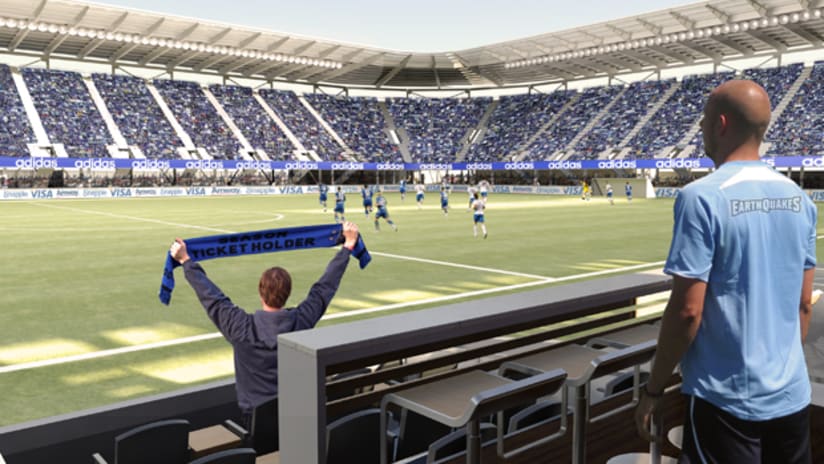SAN JOSE, Calif. — The San Jose Earthquakes have officially been cleared to build themselves a new home.
The Quakes’ plans for an 18,000-seat stadium cleared their last bureaucratic hurdle Wednesday night when the San Jose Planning Commission voted unanimously to deny an appeal by a local resident looking to have the team’s planned development permit rescinded due to noise and light concerns.
“We’re obviously thrilled with the decision,” Quakes team president David Kaval said. “We’re thrilled to move forward with the working drawings and get closer to a groundbreaking date this year.”
The decision caps a drawn-out permitting process that began 11 months ago when the team first applied to build a stadium on a 14-acre plot across the street from Mineta San Jose International Airport. Since being reborn as an expansion team in 2008, the Earthquakes have been playing in venerable Buck Shaw Stadium on the campus of Santa Clara University.
“I think it’s a win for everybody, and we will make sure we’re good neighbors,” Quakes owner Lew Wolff said.
The team received its Planned Development permit in December, only to have nearby resident Nancy Thomas ± a member of the Newhall Neighborhood Association, which has consistently raised concerns about the project — file an appeal in January.
Staff from San Jose’s planning department recommended that the commission should reject Thomas’ appeal, which they finally did by a 6-0 count at 9:17 pm PT, almost three hours after the meeting began.
“It’s a milestone because we can move ahead on a project,” Wolff said. “That’s a rarity these days.”
In addition to initiating production of the blueprints, Kaval said the club would immediately move forward on finalizing the financing piece of the puzzle, which stalled as the permitting process dragged out.
“We’re going full steam ahead,” Kaval said. “We’ve been in conversations with a variety of groups [regarding financing], but obviously with the uncertainty on the permit, no one wanted to make any commitments until that was done. So that was a critical step tonight.”
Drawing up plans will take three or four months, Kaval said, which means a 2013 opening — long the team’s goal — is still possible. Kaval left the door open for that date to be pushed back, however.
“It’s hard to say,” Kaval said. “I’m going to have to work directly with our construction team and see the timing of it. We want to make sure that it’s built in an appropriate way, that we get the stadium done and completed, and that also it wouldn’t be a negative for the team, competition-wise. We have to weigh all those factors.”
Kaval said the club has been in serious discussions with “five or six companies” regarding naming rights on the stadium, talks that should speed up now.
The planning commission heard nearly two hours’ worth of testimony from public speakers, including MLS president Mark Abbott, who noted the fact that Wolff and his partners are footing the bill for the stadium in its entirety.
“I can tell you in 20 years [working for MLS] ... this is the first time I’ve ever spoken before a group like this and not been asking for public money,” Abbott told the commission. “It’s very unique to find, in this day and age — or any day and age, really — an ownership group like we have here in San Jose, willing to 100 percent privately finance the facility.”
Abbott also noted that the Quakes had agreed to forego staging concerts, a lucrative sideline at other soccer-specific stadiums built for MLS teams, in order to help mitigate noise concerns.
The hearing brought out an overflow crowd of more than 300 people to the San Jose City Council chambers, a group dominated by Quakes fans, who held up signs emblazoned with “Build It Now” when project opponents spoke to the commission.
“I’m married to a Brazilian,” said one stadium supporter. “Help me keep my marriage together.”
Kaval was gratified by the level of support in the room.
“I’m thrilled with the turnout,” Kaval said. “You heard that one of the planning commissioners, that it made a difference. The people here, their passion and what they meant for the Earthquakes and for the community carried the day, and that it something that we’re truly proud of.”
Residents of the Newhall neighborhood expounded on the points raised by Thomas in her appeal — namely, that the stadium’s noise and light emissions are not properly accounted for in the project’s environmental impact report, which used a sound study taken in 2007 from the Home Depot Center, and that it will significantly impact the area with bursts of sound over 55 decibels on game days. Opponents requested that the commission reopen the EIR, which would have put the project back at square one.
They were denied. And now, the Quakes are finally able to get started on building their new home.
“For over 10 years, there’s been an effort to get a stadium [in San Jose],” Abbott said after the vote. “This is the most important step in that process. It’s the goal of all of our clubs to have a stadium that they can call their own home. It’s important for the clubs, it’s important for the fans, it’s important for the community. I’m just so pleased that we were able to achieve that this evening.”
Geoff Lepper covers the Earthquakes for MLSsoccer.com. He can be reached at sanjosequakes@gmail.com


